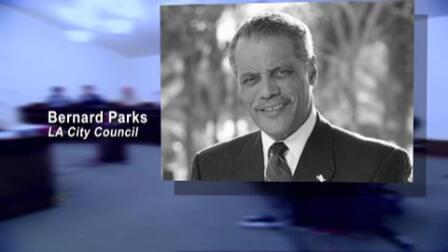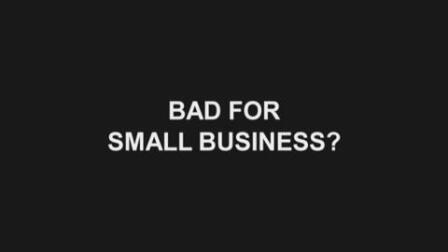Burger Binge
Over two-thirds of Americans are overweight or obese, and a big part of the problem is our appetite for fast food. So who's to blame for America’s "burger binge" — the fast food restaurants on every block that bombard us with ads, or our own urge to fill up on fries? In this report, Correspondent Brian Rooney spoke with healthy food activists, and got some very frank comments from one of America’s top fast food chains.
TRANSCRIPT:
BRIAN ROONEY: If obesity is an epidemic, much of the blame for spreading it is falling on the makers of burgers and buns, fries and shakes … calories and fat.
Rooney: Take the bad boy of the Carl's Jr. chain, the Original Six Dollar Burger; 900 calories, more than half of them from fat. Add chili cheese fries and a milkshake, you've got 2,550 calories in one meal.
[Customer: Can I get a guacamole six dollar burger please, a combo?]
Rooney: That's more than the daily recommended intake for a 30-year-old man.
Rooney: Who eats the Six Dollar burger?
John Koncki: Young hungry guys. That's our target market.
Rooney: That's your core market.
Koncki: Take a feel.
BR: John Koncki is Director of Product Development for Carl's Jr.
Koncki: Especially the bigger burgers like this one. They go for the flavor, they go for the decadence.
Rooney: Do those guys care at all about calories?
Koncki: Typically not, no.
Rooney: Even while fast food is under fire for adding inches to the American waistline, the people at Carl’s Jr. agreed to talk to us because they're unapologetic about their food … just as they are about how they market it.
[Commercial: We believe in putting hot models in our commercials because ugly ones don’t sell burgers. It’s true. …]
Rooney: Commercials like these have been called "food porn, but Carl's Jr.'s Burgers and babes sales pitch has been very successful.
[Commercial: “For Carl’s Jr., that’s just the way it is …”
Rooney: What does this company say to the critics that say you’re teaching people to eat badly, and in some cases your teaching children to eat badly?
Koncki: What happened to personal responsibility? Okay. We don't force you to come and eat our high calorie food.
Robert Gottlieb: I think it’s part of a marketing strategy that has a political content, "Oh well, these are people who are perfectly capable of making those choices and so we are absolved of any responsibility." I think that’s phony.
Rooney: Robert Gottlieb is a professor at Occidental College and a healthy food activist. He is author of Food Justice.
Gottlieb: They say, "Go for it … eat the biggest portions you can … it can drip from your mouth." And it’s part of the kind of marketing message of food connected to sex, connected to foods that are the highest in fat and salt.
[Commercial: ...leaving no evidence behind.]
Rooney: The headquarters for Carl's Jr. overlooks the Pacific just south of Santa Barbara. Inside, behind a locked door, is a kitchen laboratory where the people at Carl's Jr. dream up juicy new stuff every day - calories be damned.
Rooney: In the burger business does great flavor require fat?
Koncki: To a certain degree, yes.
Rooney: In general when you are talking about a hamburger less fat is less flavor.
Koncki: Exactly. I mean there are things we can do to minimize that, but when it is all said and done, you need a certain amount of fat to carry the flavor. That's just a simple truth. It is a scientific fact.
Rooney: Carl's is constantly testing its food. This is a blind testing at their laboratory.
Chris Snyder: They are looking at flavor, texture, amount of sauce, messiness, flavor of the cheese …
Rooney: How much does the notion of calories enter into it? Do you … have you ever created something where you've sat around and said, ‘that's just too fat. We can't do that.’
Koncki: No. No. It isn't a top of mind consideration. The first consideration is does it taste good.
Rooney: Carl's Jr. has been very successful recently with a 500 calories turkey burger, sold only the way Carl's can sell it.
[Commercial: We've hired Miss Turkey.]
Rooney: They've cut a lot of sodium, and got rid of trans fats in their fries. Still, most people don't go to Carl's for the turkey, or the salads.
Rooney: What would happen to Carl's Jr. if you went all low fat, low carb, vegetables?
Koncki: We'd go out of business.
Rooney: You'd be gone?
Koncki: Yeah.
Rooney: Carl's Jr. and all the other fast food chains would already be out of business if millions if people didn't want what they sell. And that's the problem according to doctors and scientists. Too many people are eating too much of this kind of thing. In fact, 40% of American adults eat fast food once a week. Obesity has roughly triples since 1960. and according to the Centers for Disease Control, 19% of Californians and 1 in 9 children are obese.
Gottlieb: We have extraordinarily huge costs associated with … this kind of fast food penetration. … and we are all paying for it. … We have Type 2 diabetes, increasingly young people. … One health researcher calls it “diobesity”
Rooney: A lot of fast food chains started in California, including Carl's Jr., but now some communities are saying "No more." Earlier this year in South Los Angeles, where obesity is higher among people who are poor, black and Hispanic, they banned the opening of any new fast food chains.
[Ruth Pupo: Look, you’ve lost 4 pounds.]
Rooney: Here at East L.A.'s White Memorial Hospital, they are seeing the results of what Gottlieb calls "fast food penetration."
[Ruth Pupo: OK, who wants to go first?]
Rooney: Patty Rodriguez and her sons fell into the fast food, junk food trap. They ate it every day.
Patty Rodriguez: It was a big issue for me because my son would eat four bags of chips a day, the dollar chips. My little one would drink four cans of sodas in one day. And I told him, “No.” I’m sorry, but it has to stop.”
Rooney: She developed type-2 diabetes, and now the three of them are in White Memorial's program for families at risk of disease. Ruth Pupo is a dietitian here.
[Pupo: So fried foods are usually very high in fat.]
Pupo: When we look at these children that are obese now, we know that chronic disease is on its way. We are thinking about a shortened life span. The center for disease control is looking at a lifespan of 55 to 65. So, if we want our kids to live a high quality life without disease we have to look at what they are eating and make changes starting today.
Rooney: Maybe in the end the food police and the food felons agree, you have to watch what you eat.
Koncki: The calorie thing, it just makes common sense for people to understand they can't eat a big burger or big sandwich loaded with mayonnaise and all the stuff every day, twice a day, three times a day, unless they are working out like crazy to lose those calories.
Rooney: I mean you'd say "You shouldn't do that?"
Koncki: I don't do it. I couldn't. No seriously.
Rooney: But one of your burgers is pretty good once in awhile?
Koncki: Every once in awhile, you’re darn right! You’re darn right.
Rooney: THIS IS BRIAN ROONEY FOR SOCAL CONNECTED.

Healthwise is a special series examining how community and environment can impact your health. Reports are made possible by a grant from The California Endowment.























